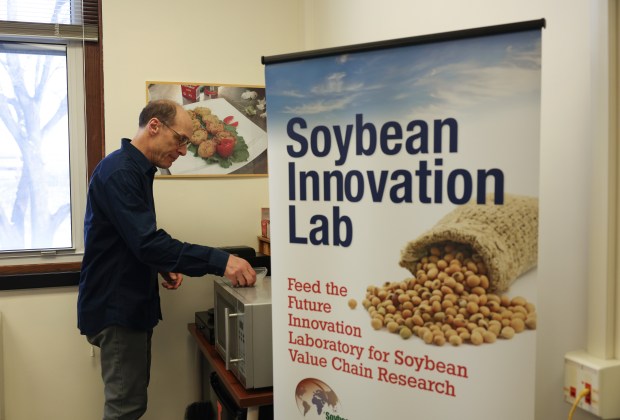A University of Illinois soybean research lab slated to close as a result of President Donald Trump’s sweeping cuts to foreign assistance has received an anonymous donation of $1 million that will allow it to remain open for another year.
The temporary lifeline for the Soybean Innovation Lab at the university’s flagship Urbana-Champaign campus came just as the center, which works to establish soybean markets in sub-Saharan Africa and other regions, was scheduled to close in mid-April, triggering layoffs for its 30-person staff.
The “very generous” donation, which came from a private enterprise in Europe that had seen coverage of the lab’s predicament, will allow the lab to retain about eight employees to continue its work helping the nascent soybean industry in the Lower Shire Valley region in southern Malawi, said Peter Goldsmith, the lab’s director.
That work was supposed to be funded by the federal government through a $1.4 million contract with the U.S. Agency for International Development. But the plug was pulled on that and the rest of the lab’s USAID funding when the Trump administration and adviser Elon Musk’s Department of Government Efficiency moved to shut down the aid agency and terminate most of its contracts.
The new funding will allow the soybean lab to finish its current project in southern Malawi, culminating in an industry tour for investors, importers, exporters and others in late August, Goldsmith said. The money also will be used to demonstrate the impact of the lab’s efforts and will buy Goldsmith time to continue his search for additional funding to keep the lab going beyond the next year.
“We’ve got some ideas, and other people have reached out as well, not just this donor, so that allows us to explore those options,” Goldsmith said Monday. But “it’s still … bleak.”
When it comes to the kind of high-risk, low-return research conducted by land-grant universities like U. of I., “the public sector is critical,” Goldsmith said. “The federal government is critical for putting the U.S. in a technological leadership position, and removing that is a big loss, and filling that in may not happen.”
Secretary of State Marco Rubio last week unveiled the Trump administration’s plan to “make the State Department Great Again” — a riff on Trump’s “Make America Great Again” slogan — which includes a diminished role for foreign assistance programs.
Goldsmith said he has not received any indication from the State Department that it is considering renewed funding for his lab and more than a dozen others at land-grant universities across the country.
While a federal court in Washington, D.C., has ruled that the moves to shut down USAID likely violated the Constitution, an appeals court allowed the dismantling to continue.
Just three years ago, the soybean lab was awarded a $30 million grant from USAID to continue its work in sub-Saharan Africa.
The lab has worked in more than 30 African countries, helping spread expertise and technology to continue growing the industry, from the plants in the ground to the manufacturing processes needed to unlock the soybean’s versatile protein and oil.
In Malawi, for example, the lab’s experts “essentially worked ourselves out of a job” in the northern part of the country by successfully spurring soybean production, Goldsmith, who’s led the lab for more than a decade, told the Tribune earlier this year. The focus shifted two years ago to the Lower Shire Valley, the country’s hotter, drier southern region, where the agriculture sector is looking to diversify from crops like sugarcane and tropical fruits.
By shutting down the lab, the federal government is doing away with an effective tool for fighting poverty and malnutrition in sub-Saharan Africa and hampering the growth of a potential export market for soybeans grown in Illinois and across the U.S., Goldsmith said.
That lost opportunity in Africa may not be apparent to farmers yet because “it’s still young; it’s still a new market; it’s still abstract,” Goldsmith said.
“It’s understandable that the (U.S.) growers would not be aggravated at the loss of the African opportunity because they don’t really see it yet,” he said. “That’s our job is to help them see it. But that’s still — it takes time.”




